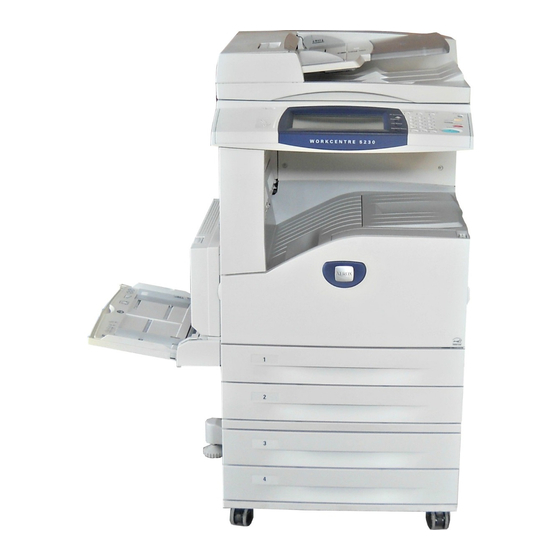Xerox WORKCENTER 5230 Referenzhandbuch - Seite 15
Blättern Sie online oder laden Sie pdf Referenzhandbuch für Drucker Xerox WORKCENTER 5230 herunter. Xerox WORKCENTER 5230 29 Seiten. Pdl reference guide
Auch für Xerox WORKCENTER 5230: Servicehandbuch Feld (24 seiten)

PostScript
This WorkCentre supports PS 3 commands that enable the features listed in the following table.
Media Size
Media Direction
Media Source
Media Source from
Bypass tray
Media Color
Media Weight
Media Class
Media Type
Media Selection
Resolution
Duplex
Tumble
Image Enhancement
Toner Save
Halftone Screen
Selection
Output Location
Copies
Collation
Offset
dc08cc0440
Customer Support
Feature
This command specifies the size of media on which to
print the job.
This command specifies the edge of the input medium
that will enter the printing engine or imager first and
across which data will be imaged. Values reflect
positions relative to a canonical page in portrait
orientation (width smaller than height):
This command specifies the tray to supply the job's
media.
This command indicates whether the input medium is to
be fed from bypass tray.
Use this command to indicate the color of the media
used to print a job.
Media weight. Unit: (g/㎡) gram per square-meter
Paper class (ex. normal, thick, recycled)
Media types are used to distinguish the type of media a
job requires.
Specify if you apply the strict setpagedevice rule to
media selection.
This command sets the resolution value.
Delivers two-sided output. Landscape documents read
like a calendar, and Portrait documents read like a book.
Deliver two-sided output. (Use combine with Duplex)
Landscape documents read like a book and Portrait
documents read like a calendar.
Specify whether you apply edge-smoothing to output
after rendering
Use this command to control toner consumption when
printing.
This command specifies the screen type.
Indicates the output bin where the print job is sent.
The number of copies to produce, either of each page
individually or of the document as a whole, depending
on the value of the Collate parameter.
A flag specifying how the output is to be organized when
multiple copies are requested for a multiple-page
document. Output consists of page sets that are
delivered together. If Collate is true, a page set consists
of one copy of all pages of the document; if it is false, a
page set consists of all copies of one page of the
document.
This feature provides a physical offset of hard copy that
distinguishes between sets or stacks within a job.
Description
Page 15
